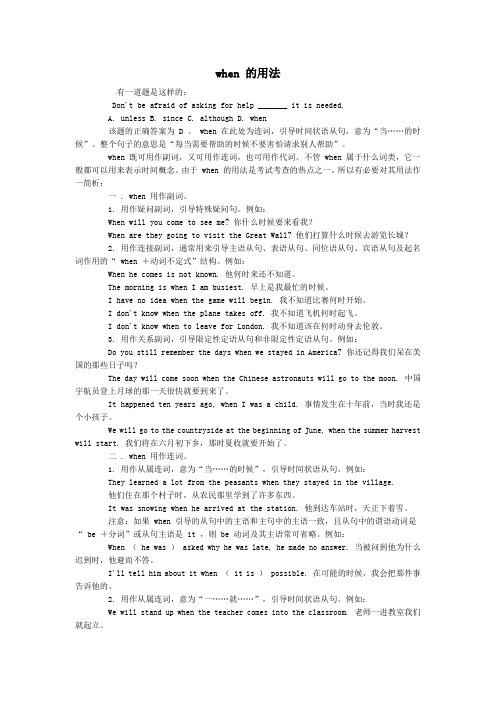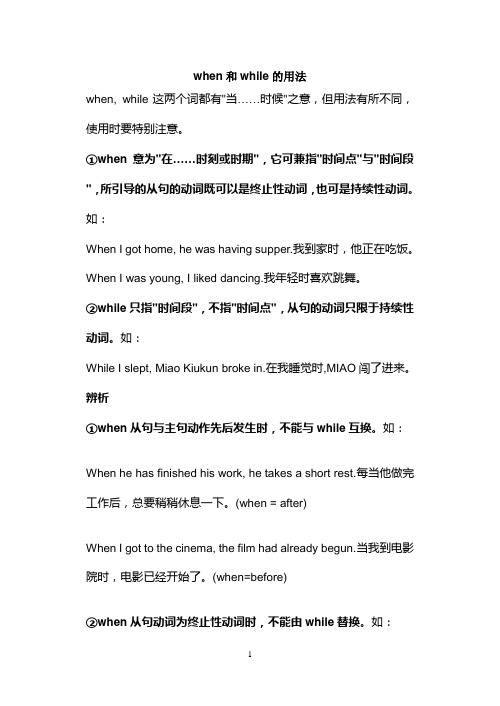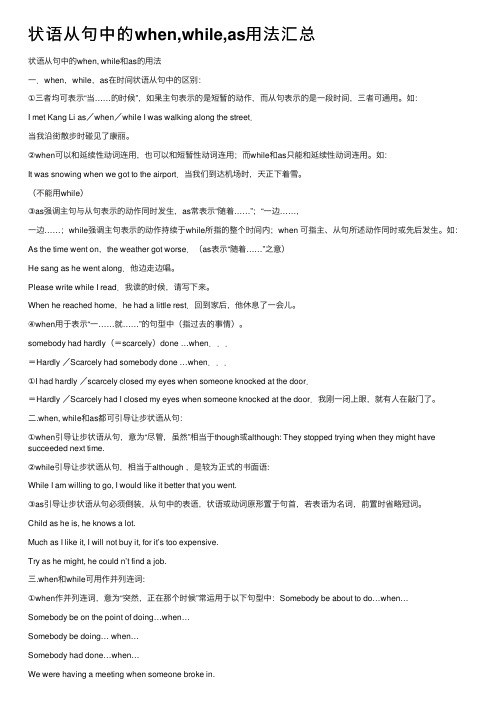when做并列连词的用法
when 的用法

when 的用法有一道题是这样的:Don't be afraid of asking for help _______ it is needed.A. unlessB. sinceC. althoughD. when该题的正确答案为 D 。
when 在此处为连词,引导时间状语从句,意为“当……的时候”。
整个句子的意思是“每当需要帮助的时候不要害怕请求别人帮助”。
when 既可用作副词,又可用作连词,也可用作代词。
不管 when 属于什么词类,它一般都可以用来表示时间概念。
由于 when 的用法是考试考查的热点之一,所以有必要对其用法作一简析:一 . when 用作副词。
1. 用作疑问副词,引导特殊疑问句。
例如:When will you come to see me? 你什么时候要来看我?When are they going to visit the Great Wall? 他们打算什么时候去游览长城?2. 用作连接副词,通常用来引导主语从句、表语从句、同位语从句、宾语从句及起名词作用的“ when +动词不定式”结构。
例如:When he comes is not known. 他何时来还不知道。
The morning is when I am busiest. 早上是我最忙的时候。
I have no idea when the game will begin. 我不知道比赛何时开始。
I don't know when the plane takes off. 我不知道飞机何时起飞。
I don't know when to leave for London. 我不知道该在何时动身去伦敦。
3. 用作关系副词,引导限定性定语从句和非限定性定语从句。
例如:Do you still remember the days when we stayed in America? 你还记得我们呆在美国的那些日子吗?The day will come soon when the Chinese astronauts will go to the moon. 中国宇航员登上月球的那一天很快就要到来了。
when-的用法

when 的用法一、when 用作副词。
1. 用作疑问副词,引导特殊疑问句。
(什么时候,何时 [at what time ])例如:①When will you come to see me?②When are they going to visit the Great Wall?2. 用作连接副词,通常用来引导名词性从句[主语从句、表语从句、同位语从句、宾语从句]及起名词作用的“when +动词不定式”结构。
(什么时候,何时 [at which; on which ])例如:①When he comes is not known. [主语从句]②The morning is when I am busiest. [表语从句]④I don't know when the plane takes off. [宾语从句]⑤I don't know when to leave for London. [宾语]3. 用作关系副词,引导限定性定语从句和非限定性定语从句。
(在…的时候 [at/on/in/during which])例如:①Do you still remember the days when we stayed in America?②The day will come soon when the Chinese astronauts will go to the moon.③It happened ten years ago, when I was a child.④We will go to the countryside at the beginning of June, when the summer harvest will start.二 . when 用作连词。
1. 用作从属连词,意为“当……的时候[at the time when ]”,引导时间状语从句。
例如:①They learned a lot from the peasants when they stayed in the village.②It was snowing when he arrived at the station.【点津】如果 when 引导的从句中的主语和主句中的主语一致,且从句中的谓语动词是“be +分词”或从句主语是 it ,则 be 动词及其主语常可省略。
英语常用词汇as, when,while用法详解

英语常用词汇as, when,while用法详解英语常用词汇as, when,while用法详解as, when,while 这三个都有“当……时候”的意思,下面是为大家的用法区别,希望能帮到大家!三者都有“当……时候”的意思,注意以下用法与区别:1. 假设从句是一个短暂性动作,而主句是一个持续性动作,可以用 as 或 when 但不用 while。
如:When [As] he came in, I was listening to the radio. 他进来时,我在听收音机。
It was raining hard when [as] we arrived. 我们到达时正下着大雨。
2. 假设主、从句表示的是两个同时发生的短暂性动作,一般要用 as 。
如:I thought of it just when [as] you opened your mouth. 就在你要说的时候,我也想到了。
3. 假设主句表示的是一个短暂性的动作,而从句表示的是一个持续性动作时,三者都可用。
如:He fell asleep when [while, as] he was reading. 他看书时睡着了。
I met him when [as, while] I was taking a walk in the park. 我在公园散步时遇到了他。
注:as 用于引出一个持续性动词表示“在……期间”时,其谓语通常只能是那些含有动作和开展意味的`动词,一般不能是那些不用于进展时态的动词,所以下面一句中的 while 不能换为 as:A:I’m going to the post office. 我要去邮局。
B:While you are there, can you get me some stamps? 当你在邮局时,能帮我买几张邮票吗?4. 假设主、从句表示两个同时进展的持续性动作,且强调主句表示的动作延续到从句所指的整个时间,通常要用 while。
when和while的用法

when和while的用法when, while这两个词都有"当……时候"之意,但用法有所不同,使用时要特别注意。
①when意为"在……时刻或时期",它可兼指"时间点"与"时间段",所引导的从句的动词既可以是终止性动词,也可是持续性动词。
如:When I got home, he was having supper.我到家时,他正在吃饭。
When I was young, I liked dancing.我年轻时喜欢跳舞。
②while只指"时间段",不指"时间点",从句的动词只限于持续性动词。
如:While I slept, Miao Kiukun broke in.在我睡觉时,MIAO闯了进来。
辨析①when从句与主句动作先后发生时,不能与while互换。
如:When he has finished his work, he takes a short rest.每当他做完工作后,总要稍稍休息一下。
(when = after)When I got to the cinema, the film had already begun.当我到电影院时,电影已经开始了。
(when=before)②when从句动词为终止性动词时,不能由while替换。
如:When he came yesterday, we were playing basketball.昨天他来时,我们正在打篮球。
③当从句的谓语是表动作的延续性动词时,when, while才有可能互相替代。
如:While / When we were still laughing, the teacher came in.正当我们仍在大声嬉笑时,老师进来了。
④当从句的谓语动词是终止性动词,而且主句的谓语动词也是终止性动词时,when可和as通用,而且用as比用when在时间上更为紧凑,有"正当这时"的含义。
when的用法小结

when 用法小结不管是在口语中,还是在书面语中,when是一个十分活跃的词,该词主要用作连词和副词,但是在意义方面其用法比较复杂。
一、作副词1. 作疑问副词,用于构成特殊疑问句,意为“什么时候;何时”。
When will they come back?他们什么时间回来?When can you finish the work? 你什么时间能完成这项工作?2. 作连接副词,引导名词性从句,或与不定式连用,意为“什么时候”。
Can you tell me when the bank opens?你能告诉我银行什么时候开门吗?When she'll be back depends on the weather. 她何时回来取决于天气。
Have you decided when to go sightseeing?你们已经决定什么时候去郊游了吗?3. 作关系副词,引导定语从句。
The main school holidays are from mid-December till early February,when the days are long and warm. 学校的主要假期是从12 月中旬到2 月初,这段时间里白天长而且很温暖。
Do you remember the time when the three of us went on a holiday in Guilin?你还记得我们三个人在桂林度假的那段时光吗?二、作从属连词,引导状语从句。
1. 表示时间,意为“当……时;在……的时候”。
When you see him, please say hello to him. 见到他时,代我问他好。
When I reached the station,the train had left. 当我到达火车站时,火车已经开走了。
2. 表示条件,相当于if。
How can I get a job when I can't even read or write?如果我连读和写都不会,我怎么能找到工作呢?3. 表示对比,相当于whereas, while, since, 意为“既然;然而”。
when的用法

when作连词的用法一、作为从属连词,引导状语从句1、表示时间,意为“当……时;在……的时候;一……就”。
(1) When you see him, please say hello to him. 见到他时,代我问他好。
(2) When I reached the station, the train had left. 当我到达火车站时,火车已经开走了。
(3) We had hardly fallen asleep when the bell rang. 我们刚刚入睡,铃声就响了起来。
2、表示原因,相当于in view of the fact that; considering that既然;考虑到。
How can I help them to understand when they won't listen to me?既然他们不愿听我的,我又怎么能帮助他们弄明白呢?3、表示条件,相当于if。
How can I get a job when I can't even read or write?如果我连读和写都不会,我怎么能找到工作呢?二、作为并列连词,引导并列句。
3、表示前面的叙述所没有提到过的信息。
相当于after which; and just then (implying suddenness)意为:一…就;正在这时(1) He was still smiling when the door opened and his wife came in.他正笑着的时候,门突然开了,他妻子走了进来。
(2) We were about to start when it began to rain. 我们刚要出发就开始下雨了。
(3) He was on the point of leaving when someone knocked at the door.他刚要走就有人敲门。
状语从句中的when,while,as用法汇总

状语从句中的when,while,as⽤法汇总状语从句中的when, while和as的⽤法⼀.when,while,as在时间状语从句中的区别:①三者均可表⽰“当……的时候”,如果主句表⽰的是短暂的动作,⽽从句表⽰的是⼀段时间,三者可通⽤。
如:I met Kang Li as/when/while I was walking along the street.当我沿街散步时碰见了康丽。
②when可以和延续性动词连⽤,也可以和短暂性动词连⽤;⽽while和as只能和延续性动词连⽤。
如:It was snowing when we got to the airport.当我们到达机场时,天正下着雪。
(不能⽤while)③as强调主句与从句表⽰的动作同时发⽣,as常表⽰“随着……”;“⼀边……,⼀边……;while强调主句表⽰的动作持续于while所指的整个时间内;when 可指主、从句所述动作同时或先后发⽣。
如:As the time went on,the weather got worse.(as表⽰“随着……”之意)He sang as he went along.他边⾛边唱。
Please write while I read.我读的时候,请写下来。
When he reached home,he had a little rest.回到家后,他休息了⼀会⼉。
④when⽤于表⽰“⼀……就……”的句型中(指过去的事情)。
somebody had hardly(=scarcely)done …when...=Hardly /Scarcely had somebody done …when...①I had hardly /scarcely closed my eyes when someone knocked at the door.=Hardly /Scarcely had I closed my eyes when someone knocked at the door.我刚⼀闭上眼,就有⼈在敲门了。
when的用法,并列连词??

并列连词when 和引导时间状语从句的从属连词when 是不同的。
这主要表现在以下几个方面:1. 位置:when 引导时间状语从句时,该从句可放在主句之前也可放在主句之后;而并列连词when 只能位于两个分句之间,而且前面常常有逗号。
例如:Come when you please.你高兴来就来吧。
(when 为从属连词)When I saw him,he was writing to a friend of his.我看见他时,他在给一个朋友写信。
(when 为从属连词)I was taking a walk,when I came across him.我正在散步,突然碰见了他。
2. 意义:when 作从属连词用时,它所引导的从句表示主句中谓语动词动作发生的时间,即作“当……时”解;而并列连词when 连接的两个分句中,第一个分句表示的是背景,第二个分句表示的是一种突然的、意想不到的情况或过早发生的事情。
when 通常含“这时突然”之义。
例如:I was thinking of this,when I heard my name called.我正想着这件事,突然听到有人叫我的名字。
I had just fallen asleep,when the boor-bell rang.我刚入睡,门铃突然响了起来。
这种意义在孤立的句子中可以理解到,在文章中更能体会得到。
如在“ I was wandering through the street when I caught sight of a tailor's shop ”一句中,“在街头漫步”只是“看见有家缝纫店”的时间,其后作者怎样走进缝纫店,想要什么样的衣服,怎样受到伙计的奚落,又怎样受到老板的奉承等情景均与“漫步街头”没有直接的因果关系。
3. 时态:when 引导的时间状语从句中可以根据句意的需要用一般现在时、一般过去时、过去进行时、分别说明现在,过去,甚至将来的行为;并列连词when 后面的分句中通常用非延续性动词的一般过去时,其前表时间的分句中可用:(1 )过去进行时表示过去某时间正在进行的动作。
- 1、下载文档前请自行甄别文档内容的完整性,平台不提供额外的编辑、内容补充、找答案等附加服务。
- 2、"仅部分预览"的文档,不可在线预览部分如存在完整性等问题,可反馈申请退款(可完整预览的文档不适用该条件!)。
- 3、如文档侵犯您的权益,请联系客服反馈,我们会尽快为您处理(人工客服工作时间:9:00-18:30)。
when 和引导时间状语从句的从属连词when 是不同的。
这主要表现在以下几个方面: 1. 位置:when 引导时间状语从句时,该从句可放在主句之前也可放在主句之后;而并列连词when 只能位于两个分句之间,而且前面常常有逗号。
例如:Come when you please. 你高兴来就来吧。
(when 为从属连词)When I saw him,he was writing to a friend of his. 我看见他时,他在给一个朋友写信。
(when 为从属连词)I was taking a walk,when I came across him. 我正在散步,突然碰见了他。
2. 意义:when 作从属连词用时,它所引导的从句表示主句中谓语动词动作发生的时间,即作“当……时”解;而并列连词when 连接的两个分句中,第一个分句表示的是背景,第二个分句表示的是一种突然的、意想不到的情况或过早发生的事情。
when 通常含“这时突然”之义。
例如:I was thinking of this,when I heard my name called. 我正想着这件事,突然听到有人叫我的名字。
I had just fallen asleep,when the boor-bell rang. 我刚入睡,门铃突然响了起来。
这种意义在孤立的句子中可以理解到,在文章中更能体会得到。
如在“ I was wandering through the street when I caught sight of a tailor's shop ”一句中,“在街头漫步”只是“看见有家缝纫店”的时间,其后作者怎样走进缝纫店,想要什么样的衣服,怎样受到伙计的奚落,又怎样受到老板的奉承等情景均与“漫步街头”没有直接的因果关系。
3. 时态:when 引导的时间状语从句中可以根据句意的需要用一般现在时.一般过去时、过去进行时、分别说明现在,过去,甚至将来的行为;并列连词when 后面的分句中通常用非延续性动词的一般过去时,其前表时间的分句中可用:( 1 过去进行时表示过去某时间正在进行的动作。
例如:
I was cooking when I heard her knocking at the door.
我正在做饭,突然听到她敲门的声音。
He was thinking about the problem,when an apple fell to the ground.
他正在思考这个问题,突然有一只苹果掉到了地上。
(2 )was /were going to,was / were about to,was / were on the point of 表示过去某一时间将要发生的动作。
例如:
I was just going when he came in.
我正要走,这时他就进来了。
We were about to start when it began to rain.
我们刚要动身天就开始下起雨来了。
He was on the point of leaving,when someone knocked at the door.
他刚要走就有人敲门。
(3 )过去完成时表示过早发生的事情。
请看下述两种场合:
(a )过去完成时和含否定意义的hardly,scarcely,nearly 连用,和just,little 连用,或者与否定词not 连用时,表示“刚……,就……”的意思。
例如:
I had hardly opened the door when he hit me.
我刚一开门他就打了我一下。
I had nearly reached the town,when the young man suddenly said very slowly,“ Do you speak English
”我快要进城了,年轻人突然慢慢地说:“你会讲英语吗”
I had been there little more than a week when I set to work in earnest.
我到那儿还不超过一个星期就开始认真干起活来。
I had not been reading for half an hour when I heard steps outside.
我读了还不到半个钟头就听到外面有脚步声。
( b )过去完成时与hardly 等连用时,when 也可以换成before
.例如:
Hardly had I left before the trouble started.
我刚一离开麻烦就开始了。
4. 句型:when 引导状语从句时,主句可以是肯定句,也可以是疑问句形式,但when 连接两个并列分句时,其前的分句只能是肯定句,即只能是不带否定副词not 的分句。
前文( 3 )( a )最后一个例句算是一个例外。
试比较
Mick was sleeping when they went in. (并列句)迈克正在睡觉,他们突然走了进来。
When they came in Mick was sleeping. (主从句)他们进来时迈克正在睡觉。
“ Was Mick sleeping when they came in ”和“ What was Mick doing when they came in ”只能是对其中主句的提问,因为这时when 所引导的分句既无突然性也不是句子中的未知信息,而只是另一个动作发生的特定时间。
